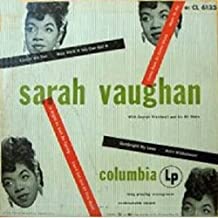
Daily Dose Of Jazz…
George McKinley Treadwell was born on December 21, 1918 in New Rochelle, New York. He played in the house band at Monroe’s in Harlem from 1941 to 1942 before working with Benny Carter in late 1942 in Florida. Following stints with Ace Harris’s Sunset Royals and Tiny Bradshaw, he worked with Cootie Williams for three years from 1943 to1946.
Joining J.C. Heard in 1946 he stayed for a year and the ensemble accompanied Etta Jones and Sarah Vaughan, whom he married in 1947. He also recorded with Dicky Wells and Ethel Waters in 1946.
George quit playing late in the 1940s to work as Vaughan’s manager, and continued in this capacity after their divorce in 1957. He also managed the Drifters and Ruth Brown and did artists and repertoire (A&R) work in the 1950s. After 1959 Treadwell also worked as a songwriter.
Trumpeter George Treadwell, whoalso led a big band and orchestra, passed away on May 14, 1967 in New York City.

More Posts: bandleader,history,instrumental,jazz,music,trumpet
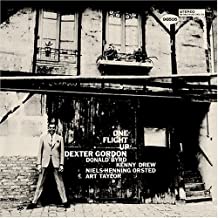
Requisites
One Flight Up ~ Dexter Gordon | By Eddie Carter
This next entry from the library is an album I first heard in 1967 during one of my Saturday stops to Record Rendezvous in Cleveland, Ohio. It introduced me to tenor saxophonist Dexter Gordon who steps into the spotlight with his second LP recorded after moving abroad, One Flight Up (Blue Note BLP 4176). It follows an excellent 1963 quartet album titled Our Man In Paris. Gordon was a staple on the jazz scene since the Bebop era in the forties while a member of Billy Eckstine’s Big Band and would become a major influence for two future giants, John Coltrane, and Sonny Rollins.
He chose to move abroad because he was treated much more fairly than here in the United States and was considered an equal rather than a second-class citizen. There was also plenty of work in some of the best jazz clubs Europe and France had to offer. Dexter is assisted here by Donald Byrd on trumpet, Kenny Drew on piano, Neils-Henning Orsted Pedersen on bass, and Art Taylor on drums. My copy used in this report is the 1967 US Liberty Records Stereo reissue (BST 84176).
Side One opens with Byrd’s Tanya occupying the entire first side and giving Dexter, Donald, and Kenny plenty of solo space. The rhythm section charts its course with a brief introduction developing into a haunting theme led by both horns. Dexter works his magic on the opening chorus with nearly six-minutes of joyful bliss. Donald shows off his chops next with a brilliant-toned performance that keeps the listener’s interest throughout. Kenny turns in one of his very best performances on the finale with Neils-Henning and Art providing the articulate foundation into the out-chorus and gentle dissolve.
Side Two commences at a slightly faster beat than Tanya with Coppin’ The Haven by Drew. The trio makes a casual, laid-back introduction evolving into Byrd and Gordon’s comfortable groove on the theme. Dexter opens with a terrific performance, then Donald takes over for a reading as smooth as a sled on fresh snow. Kenny shows he’s perfectly at home on the closer with a sharp interpretation possessing a light, refreshing beat before the ensemble reassembles for the climax.
The album concludes with the 1939 standard, Darn That Dream by Jimmy Van Heusen and Eddie DeLange, introduced in the Broadway musical, Swingin’ The Dream. This is a beautiful quartet performance by Dexter and the trio who give an intimate introduction to the melody. Dexter is the centerpiece here and his lead solo is captivating. Kenny draws the listener further into the song’s spell on the closer with a tender climax.
The album was recorded by the French engineer, Jacques Lubin, and the sound quality is spectacular with a mesmerizing soundstage transporting your listening chair to the studio alongside the musicians. Gordon’s career lasted nearly forty years, making some amazing records for a host of labels including Bethlehem, Prestige, Savoy, and SteepleChase. However, it was the five years he recorded for Blue Note (1961-1966) that are among the most precious jewels in his rich discography. He passed away on April 25, 1990, at sixty-seven from kidney failure and cancer of the larynx. If you’re a fan of Dexter Gordon or Donald Byrd, I highly recommend One Flight Up by Dexter Gordon, an album I feel is an essential addition for any jazz library that you shouldn’t miss!
~ Our Man In Paris (Blue Note BLP 4146/BST 84146) – Source: Discogs.com
~ Darn That Dream – Source: JazzStandards.com ~ Dexter Gordon – Source: Wikipedia.org © 2020 by Edward Thomas Carter
More Posts: choice,classic,collectible,collector,history,instrumental,jazz,music
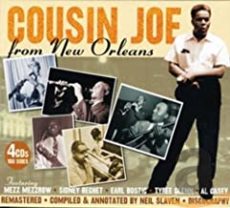
Daily Dose Of Jazz…
Pleasant Joseph, known as Cousin Joe, was born on December 20, 1907 in Wallace, Louisiana. He worked at Whitney Plantation throughout his childhood.
Until 1945 Cousin Joe toured Louisiana, and it was in that year he participated in the King Jazz recording sessions organized by Mezz Mezzrow and Sidney Bechet.
In the 1970s, he toured extensively throughout the United Kingdom and Europe, both individually and as part of the American Blues Legends ’74 revue organised by Big Bear Music. He recorded the album Gospel-Wailing, Jazz-Playing, Rock’n’Rolling, Soul-Shouting, Tap-Dancing Bluesman From New Orleans for Big Bear.
Blues and jazz singer Cousin Joe passed away on October 2, 1989 in his sleep from natural causes in New Orleans, at the age of 81.

More Posts: bandleader,history,instrumental,jazz,music,piano,vocal
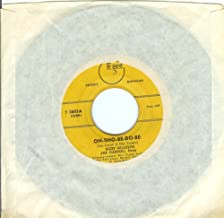
Daily Dose Of Jazz…
Albert Francis Jones was born on December 18, 1930 in Philadelphia, Pennsylvania and started to play the drums at the tender age of three. In 1949 he played with Lionel Hampton and with Dizzy Gillespie in 1951~1953 that included four tours of Europe.
In the early Fifties he also worked with Joe Carroll, Miles Davis, Milt Jackson, and Wade Legge. Later that decade he played with Arnett Cobb and accompanied Billie Holiday, Sarah Vaughan, and Dinah Washington.
After touring Europe with alto saxophonist Jackie McLean and the Living Theater of New York in 1962, he permanently moved to Belgium. There he led a group with Jean Fanis and Roger van Haverbeke, that became the house band in a Belgian club. This ensemble played with visiting musicians such as Dexter Gordon, Milt Jackson, Art Farmer, Clark Terry. and Dany Doriz.
Drummer Al Jones passed away in April 1976.

More Posts: drums,history,instrumental,jazz,music
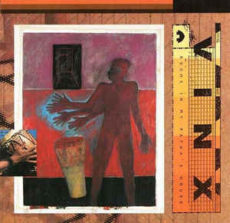
The Quarantined Jazz Voyager
The continual disregard of the health and safety of others during this medical state of our country by certain factions who want the recently removed days of old by contributing new surges in Covid cases, gives me added incentive to remain sequestered and listening to great music. This week I am turning to a resident of Cannes, France and pulling from the shelves the March 12, 1991 released album Rooms In My Fatha’s House by Vinx.
To claim him as a vocalist would be an injustice, Vinx owns the songs on this debut release, where up is the only way he can go. His unique, interpretive phrasing and melodic presentation expresses so much more that I was taken from the first note of his voice, which is why I have enjoyed this over the years and recommend it for your listening pleasure.
The session was produced by Greg Poree, John Eden, Sting, and by Vinx on track 2. It was released on the Pangea record label and distributed by Capitol Records-EMI Of Canada.
Tracklist | 54:43- Tell My Feet ~ 4:44
- I Should Have Told Her ~ 3:41
- My TV ~ 4:19
- While The City Sleeps ~ 4:46
- I’ll Give My All To You ~ 4:23
- Captain’s Song ~ 4:32
- Somehow Did You Know ~ 4:44
- Little Queen ~ 3:44
- Temporary Love ~ 4:07
- Porch Light ~ 6:02
- Don’t Got to Be That Way ~ 5:16
- A Little Bit More ~ 6:24
- Sting ~ Bass, Backing Vocals
- Herbie Hancock ~ Piano
- Sheryl Crow ~ Vocal, Guitar
- Taj Mahal ~ Guitar, Vocal
- Branford Marsalis ~ Saxophone
When the curtain goes up and the pandemic is controlled I will return to flying around the globe discovering the best of jazz. Until that time arrives, stay safe and healthy.
More Posts: adventure,club,drums,genius,jazz,museum,music,preserving,restaurant,travel,vocal


